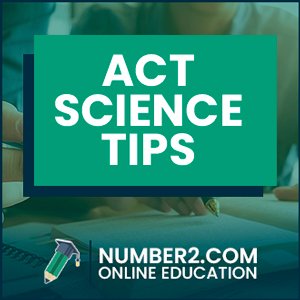 Tricks & Strategies to Ace the ACT Science Section Test
Tricks & Strategies to Ace the ACT Science Section Test
The ACT Science section is the fourth section of the test consisting of 40 science-based questions totaling 35 minutes of testing. The science section often makes students nervous because they think it’s full of complex scientific experiments and topics.
It’s actually quite different with larger reading passages for students to read and answer the questions. Don’t underestimate this test because around four questions in each test will test your previous background science knowledge. In order to ace the science section, you’ll need to understand many Math, Physics, Chemistry, and Biology topics.
Let’s see some of the best tips for the ACT Science test and methods you can use increase your ACT test score.
10 ACT Science Section Tips that You Need to Know
Here are the top 10 ACT Science tips to pass your ACT test and improve your test score.
- Study the Question Types
- Manage Your Time
- Find the Answer in the Passage
- Know Your Vocabulary
- Do the Easy Passage First
- Gauge the Question Difficulty
- Know the Passage Types
- Rule out Wrong Answers
- Pace Yourself
- Guess, if Nothing Else
General ACT Science Tips
Tip #1: Know the Passage & Question Types
There are three different passage & question types on the ACT science test:
- Research Summary: experiments
- Data Representation: topical information
- Conflicting Viewpoints: different theories of a specific topic
Each of these have drastically different answers and strategies. Study each of them, so you are familiar with the format and understand how to answer them.
Tip #2: Manage Your Time
The key in the science section is to manage your time. You only have about 7 minutes per passage to answer the questions, so don’t waste it. You need to manage your time in order to get through all of the passage.
Tip #3: Find the Answer in the Passage
More likely than not, you will probably need to refer back to the passage for an answer. You don’t want to spend a lot of time doing this, but you should be able to find your answer and verify that you are are correct before moving on.
Tip #4: Know Your Vocabulary
Scientific topics have a lot of specialized vocabulary words. Take the time to brush up on them and memorize as many vocab words as you can. If you understand the words, you will understand the question much easier. Knowing what the words mean is half the battle.
Tip #5: Do the Easy Passage First
The passages on the science section are not ordered in any way. They are not topical or ordered by difficulty. You should flip through each passage and rate them from easiest to hardest and start working on the easy ones first. You don’t want to waste all of your time in the beginning doing the hardest ones first and leave yourself with no time to tackle the rest of the passages.
Tip #6: Gauge the Question Difficulty
Look at the questions an gauge how difficult they are. If they are really difficult, you may want to flag them to come back and look at them again. Don’t waste too much time trying to rationalize answers you don’t know on difficult questions. You are better off flagging it and coming back to it.
Tip #7: Assume the Data Tends
You will occasionally get asked about data that isn’t on the chart, graph, or example. If it’s right outside the displayed data, you can assume that the date trend continues and matches the graphs you are shown.
Tip #8: Rule out Wrong Answers
There is always at least one answer that is rather ridiculous that can be eliminated. Sometimes there are two or three. When you don’t know which answer is correct, use process of elimination to rule out some of the incorrect answers.
Tip #9: Pace Yourself
Set a good pace from the beginning of your test. A pace that is too fast will cause you to over look key details and leave you with too much time at the end of the test. A pace that is too slow will leave you with not enough time to finish the test. Set a pace and manage your time.
Tip #10: Guess, if Nothing Else
If you don’t know the answer, can’t figure it out, and don’t have time to go back again, just guess. Pick an answer. Go with your lucky letter, although B is statically documented to correct more than the other letters. When in doubt, just guess an answer. You don’t get penalized for incorrect answers, so you might as well take a shot at it.
What is the ACT Science Section?
The ACT science section is a 40-question test that measures a student’s analysis, interpretation, reasoning, problem-solving, and evaluation skills in natural sciences. The test comprises sciences passages focusing on chemistry, biology, physics, and space/earth sciences. The different texts are presented in various formats that include conflict viewpoints, research summaries, and data representation.
You don’t need advanced science knowledge to take the test, but you might need background knowledge in introductory courses. The test’s main emphasis is scientific reasoning skills rather than scientific content recall, reading ability, and mathematics skill. Therefore, one should understand the principles behind logical reasoning and scientific reasoning instead of the science itself.
What Skills & Topics are Covered on the ACT Science Section?
It is important to note that the test will evaluate the application of a student’s analysis, interpretation, problem-solving, analysis, and reasoning skills in natural sciences. The skills tested in the data interpretation reporting category include analyzing information, data comparison, understanding tables and graphs, data combination from different sources, and forming mathematical relationships. The data representation part represents around 38% of the test, which is 15 questions.
The other skill tested is research summaries or scientific investigation, which assesses the student’s understanding of experimental methods and designs, determining hypotheses, and finding experimental differences and similarities. The section comprises 18 questions forming around 45% of the test. The last skill set tested is models, experimental results, and inferences evaluation of conflicting viewpoints. This reporting category tests the ability to identify model assumptions, implications, predictions and, characteristics and how they undermine or support hypotheses.
Subjects covered in ACT science include the science subjects covered since grade 7 up to introductory college level. The test evaluates the knowledge in various topics from the four sciences.
Biology
The biology (botany, zoology, and ecology) section tests students on cell biology, natural selection, genetics, RNA, DNA, ribosome, photosynthesis and respiration, taxonomy, and greenhouse gases.
Chemistry
Chemistry (organic chemistry, nuclear chemistry, and biochemistry) tests topics on PH scale, molar mass concepts, basic molecular structure, freezing/boiling point of water, phase changes, and interaction of charges.
Physics
Physics (thermodynamics and mechanics) tests students in gravity, density rules, density formula, and potential versus kinetic energy.
Space/Natural Sciences
Space/natural sciences (geology, astronomy, and oceanography) test knowledge on earth sciences.
Mathematics
The math section tests basic math skills, and you are not allowed to use a calculator. Instead, use your intuition to solve the question according to the information provided in the passage.
ACT Science Test Format & Structure
The tests comprise 40 questions that the student has to attempt within 35 minutes, which means you will have around 53 seconds per question. The exam is divided into six reading passages comprising 6-7 questions.
This part is the fourth and final of the ACT unless one wants to take the writing test. If you take the writing test, you will have a five-minute break after the science section. It is important to note that you don’t need a calculator when taking the exam because, according to ACT, calculators are not necessary.
The questions in the Science section give four answered multiple-choice options. As indicated, you will not need advanced scientific knowledge to answer the questions, but basic background knowledge can come in handy. The main emphasis is scientific reasoning, and the questions are broken down into categories.
The data interpretation reporting category will have 18-22 questions, the scientific investigation 8-12 questions, while the models, experimental results, and inferences evaluation category will comprise 10-14 questions.
How is the ACT Science Test Graded?
The average score is around 20.8%, and usually 6% of the students taking the ACT score on average 20.8 in the Science section.
What is a Good ACT Science Score?
A good ACT science score is 23 or above. Chances are that the student will pass the science course in freshman year in college.
Who Should Take the ACT Science Section?
Since the ACT is a junior-level test, it is recommended that you first take the ACT in the spring of the junior year when what you study up to 11th grade is still fresh in your brain. You can take the ACT in February, April, or June, and this works for students attempting the ACT in junior year.
If you are not satisfied with the spring score, you can take the ACT in the fall of senior year. Most students take the test on the September and October testing dates.
The ACT is available for high school students thinking of advancing to college. Therefore, you can prepare early if you plan to take the ACT by taking a science course in your senior year, even if it is not necessary for graduation. Some of the colleges that you might be applying to might require you to pass science courses to graduate. Therefore, prior science skills can make the transition easier.
ACT Science Testing Fees
Exam cost:
- Registration Full ACT (with writing) – $70 (includes reports for you, high school, and four colleges)
- Registration Full ACT (no writing) – $55 (includes reports for you, high school, and four colleges of choice)
- Test change $15 (to switch to ACT with writing)

